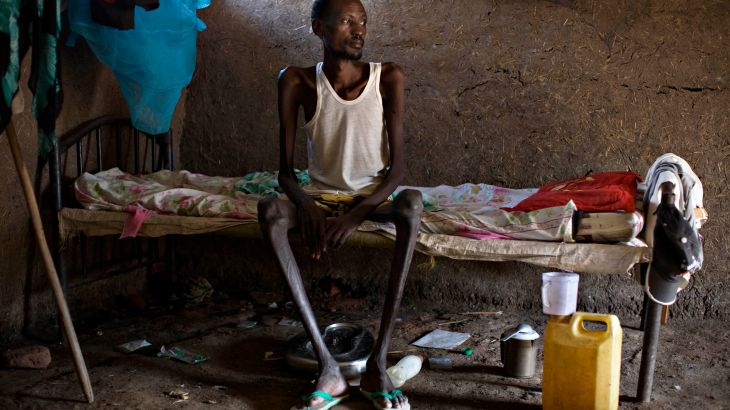Tuberculosis rates rocket amid Ukraine, Sudan conflicts
Disease surges as health officials try to address the accessibility of treatments and trials for a new vaccine commence.

The world must invest more to develop new vaccines and tackle a surge in tuberculosis (TB) fuelled by the impact of COVID-19 and conflicts including in Ukraine and Sudan, health officials and activists say.
“End TB now,” chanted protesters at a crowded meeting of top United Nations health leaders on Monday at the UN headquarters in New York.
Keep reading
list of 4 itemsSudan fighting in its 23rd day: A list of key events
Two Congo virus-related deaths cause alarm in Pakistan
WHO officially launches mRNA vaccine tech hub in Cape Town
Speeches were made by TB sufferers and UN Deputy Secretary-General Amina Mohammed spoke about how her father passed on tuberculosis to her two-year-old sister. The disease claimed his life at age 60 but her sister, now 50, is a survivor.
“Tuberculosis is the biggest infectious disease killer in the world today, taking the lives of around 4,400 people every day around the world, including 700 children,” said Dr Lucica Ditiu, executive director of the Stop TB Partnership, at the gathering.
Mohammed said the global response to tuberculosis has saved 74 million lives since 2000. But in 2021 alone, the disease infected more than 10.5 million people and killed 6.1 million. It is now the leading cause of death for people with HIV.
The TB epidemic is driven by a host of factors, including poverty, malnutrition and HIV, and disproportionately affects the most vulnerable in all countries, Mohammed said, stressing these drivers of the disease must be addressed.
She said $22bn is needed to provide all people diagnosed with TB access to quality treatment by 2027 along with access to health and social benefits so they do not suffer financial hardship – and an additional $5bn a year is needed for research and innovation.
“We can develop safe and effective tuberculosis vaccines and simple one-stop shops for quality tests and care,” Mohammed said. “This would be a game changer.”
‘Reversing significant gains’
World Health Organization Director-General Tedros Adhanom Ghebreyesus said in a video addressing the meeting that COVID-19 “turned our world upside-down” for three years, and in addition to the millions of deaths, it deprived millions of people of essential health services, including for tuberculosis.
“Conflicts across Europe, Africa, and the Middle East have made life-saving services even harder to access for people living with TB,” said Tedros. “These challenges have been a setback in the fight against TB, reversing some of the significant gains we have made over the past 20 years in expanding access to prevention, testing and treatment.”
Dr Özlem Türeci – chief medical officer of BioNTech, which developed one of the main COVID-19 vaccines with Pfizer – told the meeting her company started trials of a new vaccine candidate for tuberculosis several weeks ago.
Because of a lack of funds, it has taken 19 years to get three or four vaccines for TB to phase three trials, whereas the COVID vaccine was developed in a year.
Before COVID, which like TB is transmitted through the air, “we didn’t see very dramatic cases of TB”, she said, “but after COVID, we saw a type of TB that we saw in … movies in which people spit blood and they are very weak, and so on”.
‘A ticking bomb’
Ditiu said the economic impact of COVID and conflicts, first and foremost in Ukraine but now also in Sudan, are having “a huge impact” on efforts to treat people with TB and diagnose new cases.
Ukraine has the highest number of estimated people with TB in Europe – 34,000 – and also a high number with drug-resistant tuberculosis.
“It’s remarkable, the fact that the Ukrainian people are actually showing an amazing resilience in doing their best to maintain the services for TB,” Ditiu said. “But obviously a lot of people left the country.”
Nonetheless, she said, considerable efforts have been made to track down those with the disease, but what worries everyone is to ensure that people in Ukraine have access to treatment.
According to the Stop TB Partnership, which is managed by the UN Office for Project Services and aims to achieve a world free of tuberculosis, 18,000 people in Sudan received treatment in 2021.
Ditiu said the situation there for TB sufferers because of the ongoing fighting and collapse of most of the health system is “probably like a ticking bomb”.